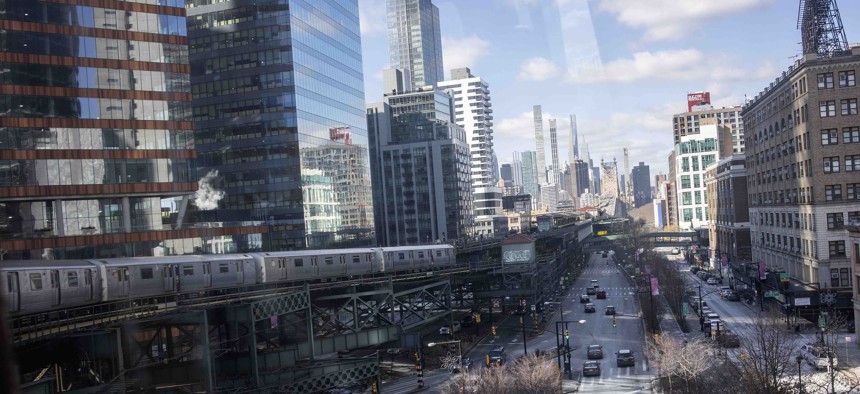City Leaders Back Biden in Controversy Over Infrastructure Spending

A subway train on elevated tracks passes between gleaming office buildings and a divided highway, with the Manhattan skyline on the horizon. Andrew Lichtenstein/Corbis via Getty Images
Local transportation officials praised the administration’s focus on how public works dollars could further environmental and social goals, despite pushback from state DOTs and Republicans.
Transportation leaders from some of the country’s biggest cities are coming to the defense of the Biden administration, in a growing controversy over the administration’s plans to use money from the new infrastructure law to further its left-leaning agenda.
The department heads of transportation agencies in 34 cities – including New York, Los Angeles and Chicago – signed a letter made public on Friday, saying they “are encouraged by and applaud” those plans. The city officials said their transportation infrastructure, when combined, serves half of all U.S. residents.
“We urge the White House and [the U.S. Department of Transportation] to follow through on campaign promises to address climate change and racial inequity, fix our crumbling infrastructure, develop high-quality and widely available transit, and provide all Americans with a clean, safe and resilient transportation system,” they wrote.
The letter, which was coordinated by the National Association of City Transportation Officials, is an implicit rebuke to state transportation departments, Republican governors and GOP senators that have criticized the Biden administration for its approach.
The commotion started when Stephanie Pollack, the deputy administrator who runs the Federal Highway Administration, issued guidance in December outlining how the agency would administer new funds included in Biden’s signature infrastructure bill.
Pollack said FHWA would encourage states to fix existing roads rather than expand them or build new ones. She also said the agency would promote projects that reduced greenhouse gas pollution, expanded transit, added bike lanes and incorporated stakeholders like local governments.
But most of the new transportation money included in the Infrastructure Investment and Jobs Act is actually directed to state governments, through formulas written by Congress. The FHWA has little say in how that money is spent – something that Pollack’s critics have repeatedly pointed out.
Federal regulators do have some tools at their disposal, though. They can speed up environmental reviews for some kinds of projects, such as adding bike lanes and sidewalks, while adding more scrutiny to others, like expanding roadways.
In NACTO’s letter, the city officials also encouraged the federal agency to “publicly track how federal formula funds are spent to promote accountability.” That could encourage states to use their highway funds to support transit projects, instead, they noted.
“The infrastructure bill presents a once-in-a-generation opportunity to transform the nation’s infrastructure for the better. However, a business-as-usual approach to spending these funds will only exacerbate the many crises plaguing the transportation sector,” they wrote.
The city officials also praised the Biden administration for using grant programs to promote similar goals. The federal agency can set its own criteria for many of those awards.
But they also encouraged the White House and USDOT to help break an impasse over government funding in Congress. The disagreements over unrelated issues have kept federal appropriations at levels set before the infrastructure law passed, meaning that many new programs are still waiting to get the money to get off the ground.
Among the programs waiting for funding are grants to states to reduce carbon dioxide pollution and a $5 billion discretionary grant program to help cities carry out “Vision Zero” programs or other traffic safety improvements, the city leaders noted.
“Long delays undermine the administration and cities’ shared vision for this legislation and the potential for a cleaner, safer transportation system it holds,” the city transportation officials wrote.
Daniel C. Vock is a senior reporter at Route Fifty and is based in Washington, D.C.
NEXT STORY: Biden's Municipal Broadband Push Clashes With State Restrictions






